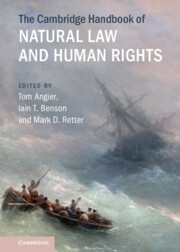Book contents
- The Cambridge Handbook of Natural Law and Human Rights
- The Cambridge Handbook of Natural Law and Human Rights
- Copyright page
- Contents
- Contributors
- Acknowledgements
- Introduction
- Part I Natural Law and the Origins of Human Rights
- Part II Natural Law Foundations of Human Rights Obligations
- 8 Ontological and Epistemological Foundations of Human Rights
- 9 The Teleological Foundations of Human Rights
- 10 New Natural Law Foundations of Human Rights
- 11 A Personalist Foundation for Natural Law and Human Rights
- 12 Acknowledged Dependence, Natural Right, and Human Rights
- 13 Eternal Law, Natural Law, Natural Rights
- Part III Natural Law and Human Rights within Religious Traditions
- Part IV The Human Person, Political Community, and Rule of Law
- Part V Rival Interpretations and Interpretive Principles
- Part VI Challenges and Future Prospects
- Index
12 - Acknowledged Dependence, Natural Right, and Human Rights
Augustinian Humility, Charles Malik, and the Universal Declaration
from Part II - Natural Law Foundations of Human Rights Obligations
Published online by Cambridge University Press: 03 November 2022
- The Cambridge Handbook of Natural Law and Human Rights
- The Cambridge Handbook of Natural Law and Human Rights
- Copyright page
- Contents
- Contributors
- Acknowledgements
- Introduction
- Part I Natural Law and the Origins of Human Rights
- Part II Natural Law Foundations of Human Rights Obligations
- 8 Ontological and Epistemological Foundations of Human Rights
- 9 The Teleological Foundations of Human Rights
- 10 New Natural Law Foundations of Human Rights
- 11 A Personalist Foundation for Natural Law and Human Rights
- 12 Acknowledged Dependence, Natural Right, and Human Rights
- 13 Eternal Law, Natural Law, Natural Rights
- Part III Natural Law and Human Rights within Religious Traditions
- Part IV The Human Person, Political Community, and Rule of Law
- Part V Rival Interpretations and Interpretive Principles
- Part VI Challenges and Future Prospects
- Index
Summary
This chapter explores connections among one ‘virtue of acknowledged dependence’, humility, as elaborated by Augustine; the right or just according to nature; and human rights. The opening section argues that in defending virtuous humility, Augustine defends a new account of natural right, supporting this thesis with a reading of The City of God, books I-V. After this analysis, our focus shifts a central framer of the Universal Declaration of Human Rights, Lebanese philosopher-diplomat Charles Habib Malik. Drawing on the archive of Malik’s papers and on his publications and lectures, we offer a select history of Malik’s study of Augustine’s work and his distinctively Augustinian perspective on themes such as humility, natural right and natural law, and human rights. We turn next to the text of the Universal Declaration, considering its Augustinian affinities as well as key divergences from Augustine’s views. The final sections of the chapter argue that Augustinian notions of humility and pride are central to Malik’s appraisal of the Declaration and the contemporary human rights project more generally, in their substance as well as their modes of expression.
Keywords
- Type
- Chapter
- Information
- The Cambridge Handbook of Natural Law and Human Rights , pp. 175 - 189Publisher: Cambridge University PressPrint publication year: 2022

